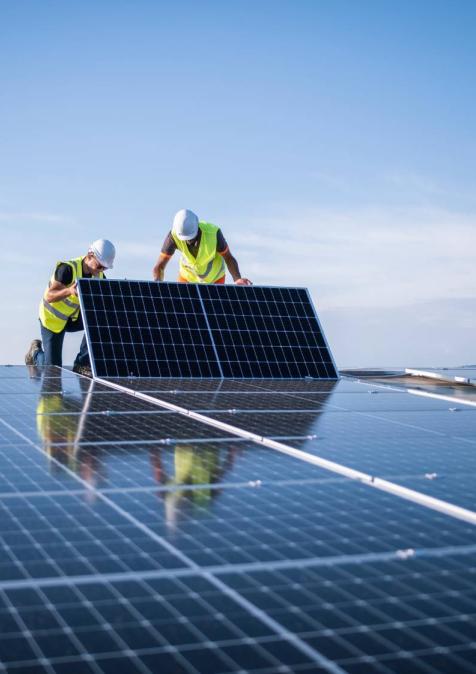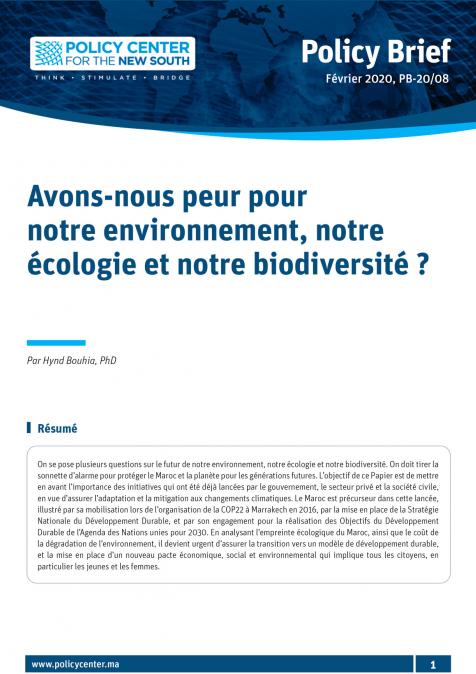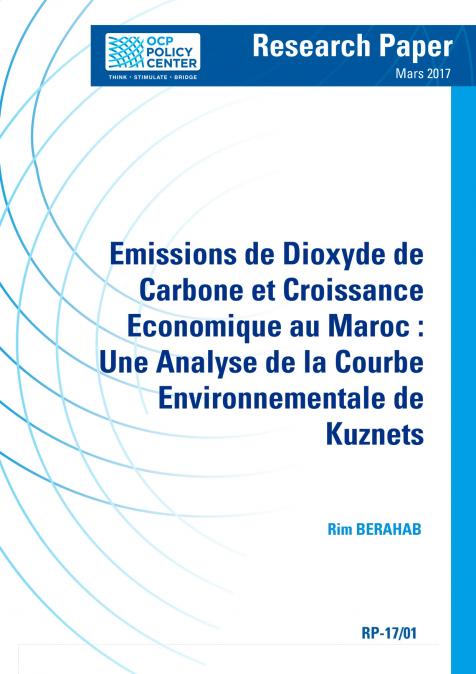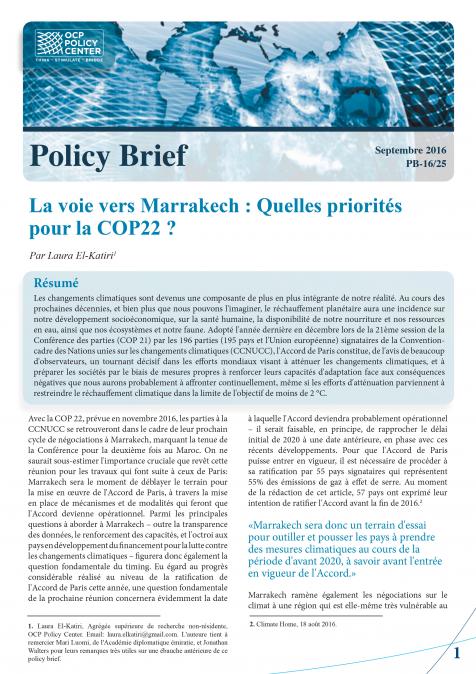Publications /
Opinion
This Opinion was originaly published on kalam.chathamhouse.org
Morocco’s environmental governance rests on a comprehensive constitutional and legal architecture that establishes the right to a healthy environment as a fundamental right. The 2011 Constitution obliges the state to ensure equal access to water, a healthy environment, and sustainable development while also requiring the protection of natural resources and future generations, and guaranteeing equal environmental rights for men and women. Institutional frameworks and supporting laws – such as the Water Law (2016) and Environmental Assessment Law (2020)[1] – along with the National Charter for the Environment – establish oversight bodies and enforcement mechanisms; affirm the right to public participation in environmental decisions; and support environmental awareness.
However, translating these normative commitments into effective policy implementation requires overcoming systemic institutional constraints and strengthening participatory mechanisms to ensure meaningful citizen engagement in environmental decision-making.
Creating robust institutional frameworks
Morocco has achieved notable progress in decentralization, renewable energy development and climate change adaptation. Specialized institutions such as the Water Basin Agency and the Environmental Police, together with a system of environmental liability and enforcement mechanisms, support prevention, remediation and accountability, and public engagement. Local governments are required to integrate environmental principles into planning. These foundational steps aim to empower local governance and foster greater political participation.
Morocco’s commitment to climate action is also evident in landmark statements such as the Rabat Declaration (2016) and the Agadir Declaration (2017), which underscore the critical role of local and regional entities in sustainable development and adaptation. One key practical outcome is the Subnational Climate Finance Expertise Programme, an innovative partnership that has been instrumental in helping local authorities develop project pipelines and financial models for climate change mitigation and adaptation. Morocco is also actively developing Territorial Climate Plans: since 2020, studies have been launched in seven regions, adding to earlier initiatives in Marrakech-Safi and Souss-Massa. The Souss-Massa region delivered concrete results, including increased civil society engagement on climate issues, the regeneration of 10,000 hectares of argan tree biosphere, effective flood protection in Greater Agadir, expanded drip irrigation, and the introduction of environmental labelling for tourist establishments.
Additionally, the EU funded Clima-Med project is supporting 11 Moroccan cities in developing Sustainable Energy Access and Climate Action Plans. These strategies address climate risks, such as flood management and coastal erosion in Mohammedia. At the national level, Morocco consistently demonstrates its commitment to global climate transparency through Biennial Update Reports.
Persistent bottlenecks to implementation
Despite significant positive outcomes and proactive initiatives, the full realization of Morocco’s ambitious reform agenda continues to face challenges. While frameworks are in place, political participation and institutional transparency are still developing, largely because key laws governing power distribution are still evolving.
Many public institutions contend with limited autonomy, a lack of capacity and resource constraints, which hinder effective implementation. For instance, in municipal waste management Morocco has introduced sound technical and environmental regulations and approved 25 Environmental Impact Assessments, yet local authorities still require greater technical expertise and capacity. Similarly, forestry sector initiatives have underscored the need for thorough risk assessments and specialized training to enable meaningful stakeholder participation in climate adaptation projects.
These challenges highlight that while Morocco has laid important groundwork and launched essential climate initiatives, advancing political participation and comprehensive local-level climate action remains a complex and ongoing process. Continued focus on institutional capacity building, resource allocation, and public engagement will be essential.
Fundamentally, realizing the rights enshrined in Morocco’s legal framework depends on citizens’ ability to engage and exercise oversight on environmental and ecological issues. Without meaningful participation, the constitutional right to a healthy environment risks remaining aspirational rather than actionable. Citizen involvement is therefore an essential pillar of climate governance – a mechanism of public interest that ensures accountability and safeguards this fundamental right.
Advancing environmental rights in practice
Establishing an ecological democracy in Morocco depends on active citizen engagement in environmental decision-making, nurtured through the development of a green ethos and conscientious behavioural change. Equally important is access to justice in climate change matters, implementing proactive measures that enable citizens to challenge harmful environmental practices and uphold their right to a healthy environment. To date, no climate dispute has been brought before the Moroccan judiciary, which may be attributed to limited public awareness of this legal recourse alongside the civil law traditions embedded in Morocco’s legal system.
To move forward, Morocco could establish Regional Governance Capacity Hubs in each region. These hubs, sustainably funded and staffed with independent technical experts, would provide training in public finance and project management – particularly for climate initiatives – while facilitating knowledge exchange, best practices and direct technical assistance for project development. They would also serve as platforms for inter-municipal collaboration, enhancing coordination at the regional level.
At the local level, municipalities could mandate and fund Citizen-Led Local Development & Climate Action Committees. Endowed with formal advisory powers, these committees would ensure structured citizen input on local development and climate strategies, with municipal councils required to formally respond to their recommendations.
To be effective, participation must occur early – before damage occurs – by ensuring citizens have access to information about potentially harmful projects and are empowered to oppose them. Yet, realizing these rights remains challenging without formal institutional support and adequate financial and human resources from the state. Together, these measures would integrate citizen participation, legal enforcement, technical capacity, and institutionalized advisory roles into a cohesive framework for sustainable, democratic environmental governance.
________________________
[1] Riyad Fakhri and Youness Lazrak Hassouni, ‘Law and Climate Change in North African Countries: Morocco as a Case Study’, in Climate, Litigation and Justice in Africa (Bristol University Press, January 2024), 279.









